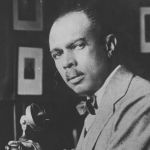Difficile est proprie communia dicere
HOR. Epist. ad Pison
HOR. Epist. ad Pison
I
Bob Southey! You're a poet—Poet-laureate,
And representative of all the race;
Although 'tis true that you turn'd out a Tory at
Last—yours has lately been a common case;
And now, my Epic Renegade! what are ye at?
With all the Lakers, in and out of place?
A nest of tuneful persons, to my eye
Like "four and twenty Blackbirds in a pye;
II
"Which pye being open'd they began to sing"
(This old song and new simile holds good),
"A dainty dish to set before the King,"
Or Regent, who admires such kind of food;
And Coleridge, too, has lately taken wing,
But like a hawk encumber'd with his hood,
Explaining Metaphysics to the nation—
I wish he would explain his Explanation.
III
You, Bob! are rather insolent, you know,
At being disappointed in your wish
To supersede all warblers here below,
And be the only Blackbird in the dish;
And then you overstrain yourself, or so,
And tumble downward like the flying fish
Gasping on deck, because you soar too high, Bob,
And fall, for lack of moisture quite a-dry, Bob!
IV
And Wordsworth, in a rather long "Excursion"
(I think the quarto holds five hundred pages),
Has given a sample from the vasty version
Of his new system to perplex the sages;
'Tis poetry—at least by his assertion,
And may appear so when the dog-star rages—
And he who understands it would be able
To add a story to the Tower of Babel.
V
You—Gentlemen! by dint of long seclusion
From better company, have kept your own
At Keswick, and, through still continu'd fusion
Of one another's minds, at last have grown
To deem as a most logical conclusion,
That Poesy has wreaths for you alone:
There is a narrowness in such a notion,
VI
I would not imitate the petty thought,
Nor coin my self-love to so base a vice,
For all the glory your conversion brought,
Since gold alone should not have been its price.
You have your salary; was't for that you wrought?
And Wordsworth has his place in the Excise.
You're shabby fellows—true—but poets still,
And duly seated on the Immortal Hill.
VII
Your bays may hide the baldness of your brows—
Perhaps some virtuous blushes—let them go—
To you I envy neither fruit nor boughs—
And for the fame you would engross below,
The field is universal, and allows
Scope to all such as feel the inherent glow:
Scott, Rogers, Campbell, Moore and Crabbe, will try
'Gainst you the question with posterity.
VIII
For me, who, wandering with pedestrian Muses,
Contend not with you on the winged steed,
I wish your fate may yield ye, when she chooses,
The fame you envy, and the skill you need;
And, recollect, a poet nothing loses
In giving to his brethren their full meed
Of merit, and complaint of present days
Is not the certain path to future praise.
IX
He that reserves his laurels for posterity
(Who does not often claim the bright reversion)
Has generally no great crop to spare it, he
Being only injur'd by his own assertion;
And although here and there some glorious rarity
Arise like Titan from the sea's immersion,
The major part of such appellants go
To—God knows where—for no one else can know.
X
If, fallen in evil days on evil tongues,
Milton appeal'd to the Avenger, time,
If Time, the Avenger, execrates his wrongs,
And makes the word "Miltonic" mean "sublime,"
He deign'd not to belie his soul in songs,
Nor turn his very talent to a crime;
He did not loathe the Sire to laud the son,
But clos'd the tyrant-hater he begun.
XI
Think'st thou, could he—the blind Old Man—arise
Like Samuel from the grave, to freeze once more
The blood of monarchs with his prophecies
Or be alive again—again all hoar
With time and trials, and those helpless eyes,
And heartless daughters—worn—and pale—and poor;
Would he adore a sultan? he obey
The intellectual eunuch Castlereagh?
XII
Cold-blooded, smooth-fac'd, placid miscreant!
Dabbling its sleek young hands in Erin's gore,
And thus for wider carnage taught to pant,
Transferr'd to gorge upon a sister shore,
The vulgarest tool that Tyranny could want,
With just enough of talent, and no more,
To lengthen fetters by another fix'd,
And offer poison long already mix'd.
XIII
An orator of such set trash of phrase
Ineffably—legitimately vile,
That even its grossest flatterers dare not praise,
Nor foes—all nations—condescend to smile,
Not even a sprightly blunder's spark can blaze
From that Ixion grindstone's ceaseless toil,
That turns and turns to give the world a notion
Of endless torments and perpetual motion.
XIV
A bungler even in its disgusting trade,
And botching, patching, leaving still behind
Something of which its masters are afraid,
States to be curb'd, and thoughts to be confin'd,
Conspiracy or Congress to be made—
Cobbling at manacles for all mankind—
A tinkering slave-maker, who mends old chains,
With god and Man's abhorrence for its gains.
XV
If we may judge of matter by the mind,
Emasculated to the marrow It
Hath but two objects, how to serve, and bind,
Deeming the chain it wears even men may fit,
Eutropius of its many masters, blind
To worth as freedom, wisdom as to Wit,
Fearless—because no feeling dwells in ice,
Its very courage stagnates to a vice.
XVI
Where shall I turn me not to view its bonds,
For I will never feel them?—Italy!
Thy late reviving Roman soul desponds
Beneath the lie this State-thing breath'd o'er thee—
Thy clanking chain, and Erin's yet green wounds,
Have voices—tongues to cry aloud for me.
Europe has slaves—allies—kings—armies still,
And Southey lives to sing them very ill.
XVII
Meantime—Sir Laureate—I proceed to dedicate,
In honest simple verse, this song to you,
And, if in flattering strains I do not predicate,
'Tis that I still retain my "buff and blue";
My politics as yet are all to educate:
Apostasy's so fashionable, too,
To keep one creed's a task grown quite Herculean;
Is it not so, my Tory, ultra-Julian?


















Comment form: